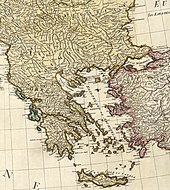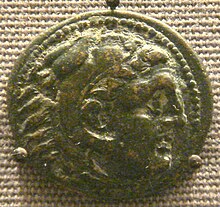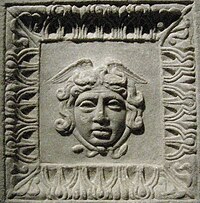Hellenistic Greece
From Wikipedia,
the free encyclopedia
| This article is part of a series on the |
| History of Greece |
|---|
 |
During the Hellenistic period the importance of Greece proper within the Greek-speaking world declined sharply. The great centers of Hellenistic culture were Alexandria and Antioch, capitals of Ptolemaic Egypt and Seleucid Syria respectively. Cities such as Pergamon, Ephesus, Rhodes and Seleucia were also important, and increasing urbanization of the Eastern Mediterranean was characteristic of the time.
Contents[hide] |
[edit] Macedonian dominance

Coin
depicting Cassander,
First post-Argead
leader of Hellenistic Greece and
Founder of Thessaloniki
The defeat of the Greek cities by Philip and Alexander also taught the Greeks that their city-states could never again be powers in their own right, and that the hegemony of Macedon and its successor states could not be challenged unless the city states united, or at least federated. The Greeks valued their local independence too much to consider actual unification, but they made several attempts to form federations through which they could hope to reassert their independence.
Following Alexander's death a struggle for power broke out among his generals, which resulted in the break-up of his empire and the establishment of a number of new kingdoms. Macedon fell to Cassander, son of Alexander's leading general Antipater, who after several years of warfare made himself master of most of the rest of Greece. He founded a new Macedonian capital at Thessaloniki and was generally a constructive ruler.
Cassander's power was challenged by Antigonus, ruler of Anatolia, who promised the Greek cities that he would restore their freedom if they supported him. This led to successful revolts against Cassander's local rulers. In 307 BC Antigonus's son Demetrius captured Athens and restored its democratic system, which had been suppressed by Alexander. But in 301 BC a coalition of Cassander and the other Hellenistic kings defeated Antigonus at the Battle of Ipsus, ending his challenge.
Antigonus II ruled until his death in 239 BC, and his family retained the Macedonian throne until it was abolished by the Romans in 146 BC. Their control over the Greek city states was intermittent, however, since other rulers, particularly the Ptolemies, subsidised anti-Macedonian parties in Greece to undermine the Antigonids' power. Antigonus placed a garrison at Corinth, the strategic centre of Greece, but Athens, Rhodes, Pergamum and other Greek states retained substantial independence, and formed the Aetolian League as a means of defending it. Sparta also remained independent, but generally refused to join any league.
In 267 BC Ptolemy II persuaded the Greek cities to revolt against Antigonus, in what became the Chremonidian War, after the Athenian leader Chremonides. The cities were defeated and Athens lost her independence and her democratic institutions. The Aetolian League was restricted to the Peloponnese, but on being allowed to gain control of Thebes in 245 BC became a Macedonian ally. This marked the end of Athens as a political actor, although it remained the largest, wealthiest and most cultivated city in Greece. In 255 BC Antigonus defeated the Egyptian fleet at Cos and brought the Aegean islands, except Rhodes, under his rule as well.
[edit] Philip V
Antigonus II died in 239 BC. His death saw another revolt of the city-states of the Achaean League, whose dominant figure was Aratus of Sicyon. Antigonus's son Demetrius II died in 229 BC, leaving a child (Philip V) as king, with the general Antigonus Doson as regent. The Achaeans, while nominally subject to Ptolemy, were in effect independent, and controlled most of southern Greece. Athens remained aloof from this conflict by common consent.Sparta remained hostile to the Achaeans, and in 227 BCSparta's king Cleomenes III invaded Achaea and seized control of the League. Aratus preferred distant Macedon to nearby Sparta, and allied himself with Doson, who in 222 BC defeated the Spartans and annexed their city – the first time Sparta had ever been occupied by a foreign power.
Philip V, who came to power when Doson died in 221 BC, was the last Macedonian ruler with both the talent and the opportunity to unite Greece and preserve its independence against the "cloud rising in the west": the ever-increasing power of Rome. He was known as "the darling of Hellas". Under his auspices the Peace of Naupactus (217 BC) brought conflict between Macedon and the Greek leagues to an end, and at this time he controlled all of Greece except Athens, Rhodes and Pergamum.
In 215 BC, however, Philip formed an alliance with Rome's enemy Carthage, which drew Rome directly into Greek affairs for the first time. Rome promptly lured the Achaean cities away from their nominal loyalty to Philip, and formed alliances with Rhodes and Pergamum, now the strongest power in Asia Minor. The First Macedonian War broke out in 212 BC, and ended inconclusively in 205 BC, but Macedon was now marked as an enemy of Rome. Rome's ally Rhodes gained control of the Aegean islands.
In 202 BC Rome defeated Carthage, and was free to turn her attention eastwards, urged on by her Greek allies, Rhodes and Pergamum. In 198 the Second Macedonian War broke out for obscure reasons, but very likely because Rome saw Macedon as a potential ally of the Seleucids, the greatest power in the east. Philip's allies in Greece deserted him and in 197 BC he was decisively defeated at the Cynoscephalae by the Roman proconsul Titus Quinctius Flamininus.
Luckily for the Greeks, Flamininus was a moderate man and an admirer of Greek culture. Philip had to surrender his fleet and become a Roman ally, but was otherwise spared. At the Isthmian Games in 196 BC, Flamininus declared all the Greek cities free, although Roman garrisons were placed at Corinth and Chalcis. But the freedom promised by Rome was an illusion. All the cities except Rhodes were enrolled in a new League which Rome ultimately controlled, and democracies were replaced by aristocratic regimes allied to Rome


No comments:
Post a Comment